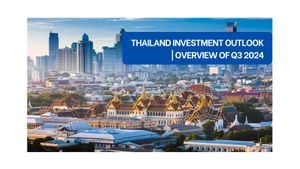The Madras High Court has made waves with its recent ruling aimed at eradicative caste-based discrimination within temple festivals. The court directed temple authorities to eliminate caste names from any future festival invitations, ensuring inclusivity for all communities, particularly Scheduled Castes (SC). This pivotal decision marks significant progress toward equality and social justice within the Hindu community.
The case, first brought to attention by KP Selvaraj, who serves as the president of the Naduvikottai Adi Dravidar Welfare Association, stemmed from the exclusion of the Adi Dravidar community's name from invitations to the annual festival at the Pattukottai Nadiamman temple located in Thanjavur. Instead of being named explicitly, the community was referenced generically as "oorars," or villagers, which implied marginalization compared to other dominant caste donors who were specified. Selvaraj contended this exclusion denied the community proper recognition and cemented systemic caste discrimination.
Expressing their concerns, Justices MS Ramesh and AD Maria Clete highlighted the importance of meaningful participation for all Hindu adherents during these festivals. The judges noted, "Temple festivals should be open to all Hindus, and participation should be meaningful rather than symbolic." They emphasized the detrimental impact of excluding certain communities from visibility, stating, "This selective visibility reinforces systemic inequality, denying Dalits both social value and meaningful participation."
The court’s deliberations revealed the historical precedence of such discrimination, with instances dating back to 2009 at the same temple, where similar issues had previously arisen, leading to peace committee resolutions. Justice Clete criticized the role of government officials who had backed the exclusion of SC communities from recognition, indicating systemic flaws within the resource allocation framework associated with temple festivities.
Through this recent ruling, the court mandated the removal of caste names entirely from invitations to temple festivals. This decision, the judges noted, would promote equal treatment and participation. Justice Clete articulated the nuanced contradiction experienced by Dalits: "The failure to explicitly recognize Dalits forces them to assert their caste identity to gain acknowledgment. True inclusivity must reconcile this contradiction by ensuring Dalits have the right to be recognized without being compelled to declare their caste identity."
Notably, the judgement echoes constitutional values, referencing Articles 14 and 17 of the Indian Constitution, which encapsulate the rights to equality and the abolition of untouchability. By forbidding caste identifiers, the court aims to dismantle barriers formed from historical caste inequalities.
Moving beyond mere nomenclature, the judges cautioned against viewing the inclusion of the Adi Dravidar name as the only necessary change. They insisted on the importance of genuine participation and integration of SC communities within the temple proceedings. The ruling signifies not just legal action against casteism but aims to navigate toward creating substantive societal change.
While the ruling is undoubtedly progressive, it faces challenges. Resistance from traditionalist factions within temple committees is anticipated, with some arguing for the preservation of conventional customs. Additional hurdles include raising awareness within marginalized communities about their rights and legal protection against caste discrimination.
Overall, the Madras High Court’s judgement serves as a clarion call for religious spaces to uphold principles of equity and inclusivity, especially during long-standing traditions such as temple festivals. The hope remains clear: by actively enforcing this directive, temple authorities hold the potential to create welcoming environments for all individuals, regardless of caste.
With the Madras High Court's decisive steps to remove caste names from temple festival invitations, this moment can trailblaze future reforms aimed at uprooting caste-based divisiveness. By enabling equal acknowledgment and celebration within temple practices, we edge closer to realizing social justice through religious inclusivity.



